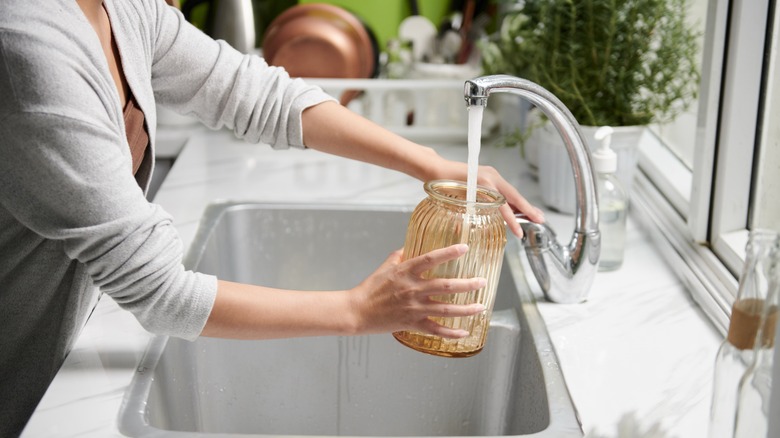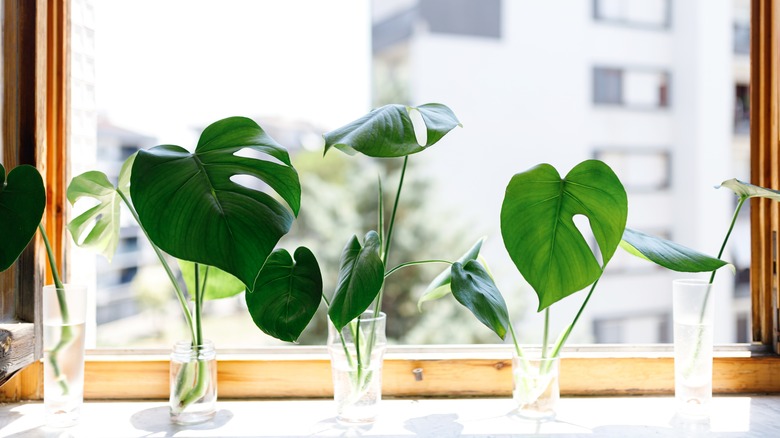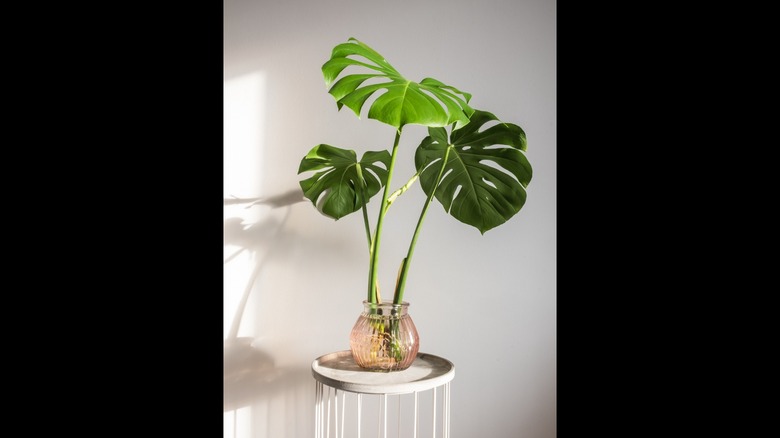The Cheesy Plant You Can Grow Indoors With Only A Little Bit Of Water, According To Our Horticulturist
The Swiss cheese plant (Monstera deliciosa) is a popular houseplant native to tropical understories in Central America. In the wild, this vining plant can reach up to 50 feet long, using its aerial roots to climb tree trunks and reach rainforest canopies. When cultivated indoors, they can grow up to 6-8 feet or more when provided adequate support. Like other indoor plants that can grow in water, the Swiss cheese plant doesn't necessarily need a pot and soil — it can be easily rooted in water and will continue to grow healthily under the right conditions. However, when grown in water, this striking tropical species may not grow as large or as quickly as a potted M. deliciosa.
Swiss cheese plants are characterized by their large, glossy green leaves that develop natural holes known as fenestrations. These holes — which give the plant its comparison to Swiss cheese — help it withstand heavy rain and wind in its natural habitat. The leaves of the young plants are smaller, heart-shaped, and without holes. These plants grow long, aerial roots that provide support as this climbing plant grows upward.
How to grow Swiss cheese plants in water
Propagation from cuttings is the best way to start a Swiss cheese plant in water. Cuttings can be taken from a mature plant at any time of year and rooted in water, potting soil, or perlite. When rooted in water, it is easy to see when the cuttings begin to grow new roots. It is also a great, simple option if you haven't got any potting soil on hand. Choose a portion of the stem with a node and axillary bud to promote rooting and cut 3 to 5 inches below the node using a clean, sharp knife or pair of scissors — a cutting that already has some aerial roots will also help your new plant establish. Applying a hormone, such as auxin, to the cut edge will encourage faster rooting.
Place the cutting in a location that receives bright, indirect light, and change the water regularly. Your Swiss cheese plant cutting should root within two to three weeks. Consider that plants propagated in water may develop weaker roots than cuttings rooted in potting soil or perlite. M. deliciosa can also be susceptible to root rot, so monitor the roots regularly to check for any that are brown or mushy.
Swiss cheese plant care
Once your cutting has successfully rooted, you can either transplant it into a potting soil or continue cultivating the plant in water. If you would like to grow a large Swiss cheese plant, the best option is to transplant your cutting into potting soil. A large, heavy container filled with soil will provide stability and accommodate a strong, healthy root system as the monstera grows. This vining plant will also need a support structure, such as a moss pole, to climb and grow upward. Consider that it is easier to incorporate a support structure into a soil-based medium rather than water.
Continuing to grow your plant in water is a good option to maintain a slightly smaller, attractive houseplant. Choose a glass vase large enough to accommodate the roots and stabilize this top-heavy species — thick glass or bowl-shaped vessels are great choices here. Change the water regularly to keep the roots healthy and supply a liquid feed at least once a month from spring through fall. Whether grown in water or soil, Swiss cheese plants prefer bright, indirect light and warm, stable temperatures of around 70 degrees Fahrenheit. Keep the leaves free of dust by wiping them regularly with a clean cloth. Not only will this help keep the characteristic glossy, split leaves looking their best, but cleaning your dusty houseplants will also ensure they capture as much sunlight as possible.


